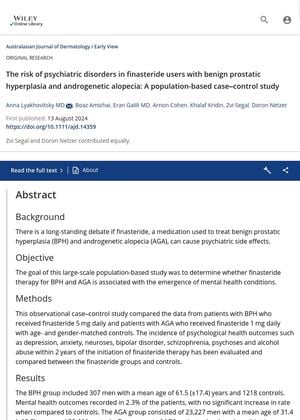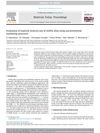December 2022 in “JAMA network open” 5α-Reductase inhibitors may increase depression risk but not dementia or suicide.
1 citations
,
April 2022 in “Journal of Cosmetic Dermatology” Androgenetic alopecia causes significant psychological distress, especially in women, and requires both medical and psychological support.
 4 citations
,
August 2021 in “Biomedicine & Pharmacotherapy”
4 citations
,
August 2021 in “Biomedicine & Pharmacotherapy” 5-alpha reductase inhibitors, like finasteride and dutasteride, may cause depression, but more research is needed to understand why.
7 citations
,
April 2021 in “Journal of Clinical Psychopharmacology” Finasteride may increase the risk of depression, anxiety, and suicidal thoughts.
 40 citations
,
November 2020 in “JAMA Dermatology”
40 citations
,
November 2020 in “JAMA Dermatology” Finasteride may cause suicidal thoughts and mental side effects, especially in young people with hair loss.
 5 citations
,
November 2020 in “JAMA Dermatology”
5 citations
,
November 2020 in “JAMA Dermatology” Finasteride may cause side effects; more research needed.
 9 citations
,
April 2020 in “The Journal of Urology”
9 citations
,
April 2020 in “The Journal of Urology” 5α-Reductase inhibitors don't cause depression.
 6 citations
,
January 2020 in “Dermatology”
6 citations
,
January 2020 in “Dermatology” Finasteride may increase suicide risk; more research needed.
 35 citations
,
June 2018 in “Urology”
35 citations
,
June 2018 in “Urology” The review suggests younger men taking 1 mg finasteride report more side effects, including sexual, skin, metabolic, and psychological issues.
 90 citations
,
March 2017 in “JAMA Internal Medicine”
90 citations
,
March 2017 in “JAMA Internal Medicine” Men over 66 taking medication for prostate enlargement have a higher risk of depression and self-harm, especially in the first 18 months of treatment.
 31 citations
,
February 2016 in “American Journal of Men's Health”
31 citations
,
February 2016 in “American Journal of Men's Health” Finasteride can cause serious emotional side effects; doctors should check patients' mental health history before prescribing.
 43 citations
,
January 2016 in “International Journal of Andrology”
43 citations
,
January 2016 in “International Journal of Andrology” Finasteride caused long-term sexual and non-sexual side effects in young men with hair loss.
 33 citations
,
January 2016 in “Skin appendage disorders”
33 citations
,
January 2016 in “Skin appendage disorders” The document concludes that sexual and psychiatric side effects from 5-alpha-reductase inhibitors are reported, but more high-quality research is needed to understand how often they occur.
 69 citations
,
July 2015 in “Pharmacotherapy”
69 citations
,
July 2015 in “Pharmacotherapy” Low-dose finasteride may cause lasting sexual dysfunction and suicidal thoughts in young men.
 81 citations
,
June 2014 in “American Journal of Men's Health”
81 citations
,
June 2014 in “American Journal of Men's Health” Finasteride can cause lasting sexual, emotional, and cognitive issues, with varying severity.
 73 citations
,
July 2013 in “The Journal of Sexual Medicine”
73 citations
,
July 2013 in “The Journal of Sexual Medicine” Finasteride use changes brain chemicals, causing lasting sexual issues and anxiety/depression.
 134 citations
,
August 2012 in “The Journal of Clinical Psychiatry”
134 citations
,
August 2012 in “The Journal of Clinical Psychiatry” Former finasteride users with persistent sexual side effects have higher rates of depression and suicidal thoughts.
 2 citations
,
September 2009 in “Hormone Molecular Biology and Clinical Investigation”
2 citations
,
September 2009 in “Hormone Molecular Biology and Clinical Investigation” Low dose finasteride decreases certain steroids, possibly increasing depression risk.




















